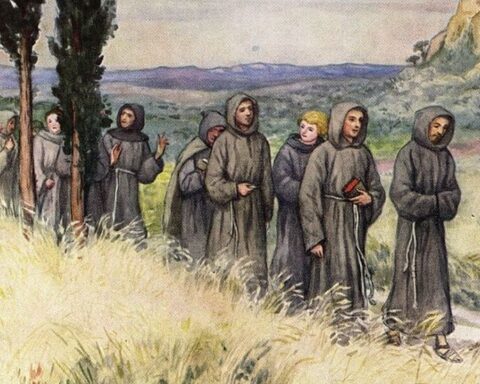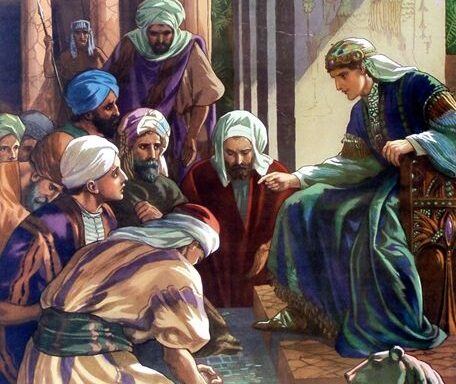
Editor’s note: The following comprises the fourth chapter, third part (C6), of The Gospel of Luke: An Exposition, by Charles R. Erdman (published 1936). All spelling in the original.
6. A Sinful Woman Forgiven (7:36-50)
___________________________________________________
36 And one of the Pharisees desired him that he would eat with him. And he entered into the Pharisee’s house, and sat down to meat. 37 And behold, a woman who was in the city, a sinner; and when she knew that he was sitting at meat in the Pharisee’s house, she brought an alabaster cruse of ointment, 38 and standing behind at his feet, weeping, she began to wet his feet with her tears, and wiped them with the hair of her head, and kissed his feet, and anointed them with ointment. 39 Now when the Pharisee that had bidden him saw it, he spake within himself, saying, This man, if he were a prophet, would have perceived who and what manner of woman this is that toucheth him, that she is a sinner. 40 And Jesus answering said unto him, Simon, I have somewhat to say unto thee. And he saith, Teacher, say on. 41 A certain lender had two debtors: the one owed five hundred shillings, and the other fifty. 42 When they had not wherewith to pay, he forgave them both. Which of them therefore will love him most? 43 Simon answered and said, He, I suppose, to whom he forgave the most. And he said unto him, Thou hast rightly judged. 44 And turning to the woman, he said unto Simon, Seest thou this woman? I entered into thy house, thou gavest me no water for my feet: but she hath wetted my feet with her tears, and wiped them with her hair. 45 Thou gavest me no kiss: but she, since the time I came in, hath not ceased to kiss my feet. 46 My head with oil thou didst not anoint: but she hath anointed my feet with ointment. 47 Wherefore I say unto thee, Her sins, which are many, are forgiven; for she loved much: but to whom little is forgiven, the same loveth little. 48 And he said unto her, Thy sins are forgiven. 49 And they that sat at meat with him began to say within themselves, Who is this that even forgiveth sins? 50 And he said unto the woman, Thy faith hath saved thee; go in peace.
___________________________________________________
The Gospel of Luke appears to place special emphasis upon the grace and forgiveness manifested by Jesus. It alone records his sympathy with the sorrowing widow of Nain, and it is also alone in expressing the sympathy which Jesus felt for the sinful woman who anointed his feet in the house of Simon, the Pharisee. It is a picture, however, not only of the loving mercy of our Lord, but of the unbounded gratitude felt by one who truly appreciated the priceless gift of his pardoning grace.
By an unfortunate error of interpretation this woman has been confused with Mary of Magdala or with Mary of Bethany. These three persons should be, however, absolutely distinct. It is true that Jesus delivered the first of these from demoniac possession, and that the second, like the woman in this story, anointed his feet with perfume, but there is every reason for believing that of the three only this woman was reputed to be a sinner. She seems to have met Jesus on some previous occasion, to have repented of her sins, and to have received from the Lord his word of forgiveness.
It was her gratitude which gave her courage to enter unbidden into the house of Simon, where Jesus was being entertained as a guest. She had come to anoint his feet but as she beheld him, she thought again of her sins and her hot tears of penitence fell upon the feet of her Lord. She hastily unbound her hair and with it dried his feet and then poured upon them a flask of fragrant ointment. No truer expression could have been given to her gratitude and passionate devotion. The fact that Jesus allowed a woman of such notorious character to express her love for him made Simon conclude that Jesus could not be a prophet, for otherwise he would have been able to discern the nature of so depraved a woman.
By his reply Jesus showed his ability to read even the secret thoughts of his host. The words of Jesus not only answered the silent criticism of Simon but also rebuked him for his own impenitence and lack of faith. Jesus proposed to his host a parable of two forgiven debtors, illustrating the fact that gratitude depends upon the realization of the amount which has been forgiven, and then he applied this principle to Simon and to the woman whom Simon had been regarding with scorn. Jesus showed how keenly he had felt the lack of love shown him by his host, and he contrasted it with the affection shown by the woman. When he had entered the house Simon had neglected the customary service of providing a bath for his feet; the woman had washed his feet with her tears. Simon had withheld the kiss with which a host usually welcomed his guests; the woman had passionately kissed his feet. Simon had not furnished the perfume with which it was usual to anoint an honored guest; the woman had come to the house with the special purpose of pouring fragrant oil upon the feet of her Lord.
In view of the parable the message of Jesus is plain, “Wherefore I say unto thee, Her sins, which are many, are forgiven; for she loved much; but to whom little is forgiven, the same loveth little.” Jesus did not mean to say that until now she had not been pardoned, nor yet that her pardon was conditioned upon her love. He meant that her love resulted from her pardon, and his words have been rightfully interpreted thus: “I say unto thee that her many sins are forgiven, as thou mayest infer from this exhibition of her love.” The remainder of the sentence was devoted to Simon, “To whom little is forgiven, the same loveth little.” The words do not prove that Simon had been pardoned; they rather indicate that his lack of love had proved his lack of penitence and so of forgiveness. Jesus then turned to the woman with a word of benediction: “Thy sins are forgiven.” He thus assured her of the pardon previously granted, but still more he vindicated her in the eyes of the guests and assured them of the new life upon which the woman already had entered. They marveled as they heard him pronouncing pardon. That is a divine function; but the ideal Man whose sympathy Luke records was likewise the Son of God. Last of all, Jesus turned to the woman with the final word of blessing: “Thy faith hath saved thee; go in peace.” This is a clear statement of the fact that faith had secured pardon and pardon had awakened gratitude and gratitude had been expressed by a deed of devoted love. Such a penitent can rightfully go away “into peace,” that is, to its present and continual enjoyment.
(Go back to previous chapter)
(Continue to next chapter)

The Gospel of Luke: An Exposition (Luke 7:36-50)
Latest from Religion

The Weimar Years – Part 1
This started out as an attempt to better understand Weimar Germany by chronicling my reactions to the audiobook version of “The Weimar Years: Rise and Fall 1918-1933” by Frank McDonough. Writing my

Alfredus Rex Fundator
"Alfred was a Christian hero, and in his Christianity he found the force which bore him, through calamity apparently hopeless, to victory and happiness."

The Story of Cortez
It seemed to me that, having to speak tonight to soldiers, that I ought to speak about soldiers. Some story, I thought, about your own profession would please you most and teach

The Coming of the Friars
When King Richard of England, whom men call the Lion-hearted, was wasting his time at Messina, after his boisterous fashion, in the winter of 1190, he heard of the fame of Abbot

“Joseph” by Charles Kingsley
Editor’s note: The following is extracted from The Works of Charles Kingsley, Vol. 25 (published 1885). (Preached on the Sunday before the Wedding of the Prince of Wales. March 8th, third Sunday



